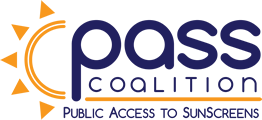FDA’s Final Guidance Regarding Over-the-Counter Sunscreen Safety and Effectiveness Continues to Fall Short While Two Year Anniversary of Sunscreen Innovation Act Becoming Law Looms
For Immediate Release: November 22, 2016
Contact: Aimee Steel Lubin, aimee.lubin@hklaw.com / 202-828-1895
(Washington, D.C.) – Today the Food and Drug Administration (FDA) published “Nonprescription Sunscreen Drug Products — Safety and Effectiveness Data – Guidance for Industry,” as required by the Sunscreen Innovation Act (Public Law 113 – 195). The Public Access to SunScreens (PASS) Coalition issued the following statement in response to the FDA’s final guidance:
“The PASS Coalition’s mission is to work collaboratively with FDA, Congress and stakeholders to ensure Americans have access to the latest sunscreen technology. We are pleased the FDA met the statutory deadline under the bipartisan Sunscreen Innovation Act to publish a final guidance on sunscreen ingredient testing. We support the changes from the earlier draft – especially changes to the formulations and the body surface area to be tested. However, we were disappointed that the agency’s approach remains inconsistent with the recommendations made by independent scientific reviewers that were published in peer-reviewed literature. We look forward to continuing to work with FDA and the new Administration to ensure that safe ingredients get to market as quickly as possible.”
The bipartisan Sunscreen Innovation Act was signed into law by President Obama on November 26, 2014. The law streamlined the approval process for new sunscreen ingredients to ensure that these ingredients receive a transparent review within a predictable timeframe. The intent of the Act was to ensure Americans gain access to the latest safe, effective and innovative sunscreen products to protect against the sun’s most harmful rays.
Each year there are more new cases of skin cancer — including melanoma — than the combined incidence of breast cancer, prostate cancer, lung cancer and colon cancer. From 1975-2011, rates of melanoma in young men and women ages 20-39 years increased by 34% in men and by 84% in women.
Although treatments for melanoma are improving rapidly, the survival rates are still low. Taking steps to prevent melanoma are key, and part of those steps is using the most technologically advanced sunscreen products available. People around the world are doing that, but they aren’t in the U.S.
According to the Surgeon General, nearly 5 million Americans are diagnosed with skin cancer and one person dies every hour of every day from melanoma, the deadliest skin cancer. Most of these cases are preventable. The cost to treat skin cancer is over $8 billion, which doesn’t include the pain and suffering for families that lose their loved ones from the disease. The Surgeon General and CDCboth regularly call on Americans to wear sunscreen to prevent skin cancer.
The last over-the-counter (OTC) sunscreen ingredient to be approved by FDA was in the 1990s. Since 2002, eight new sunscreen applications have been filed and are still awaiting final decisions 14 years later. New sunscreen technologies currently awaiting approval in the U.S. have been widely available in Europe, Asia, and Central and South America, in some cases for more than 20 years.
PASS Coalition website: https://www.passcoalition.com/
PASS Coalition Facebook page: https://www.facebook.com/PASSCoalition?ref=hl
PASS Coalition Twitter page: https://twitter.com/PASSCoalition
________________________________________________________________________
The PASS Coalition is a multi-stakeholder coalition of public health organizations, dermatologists, sunscreen ingredient companies, and concerned citizens who will work collaboratively with the FDA, the White House and Congress to establish a timely and transparent framework for approval of the next generation of UV active filters for OTC sunscreens. Click here to see the full membership of the PASS Coalition.
